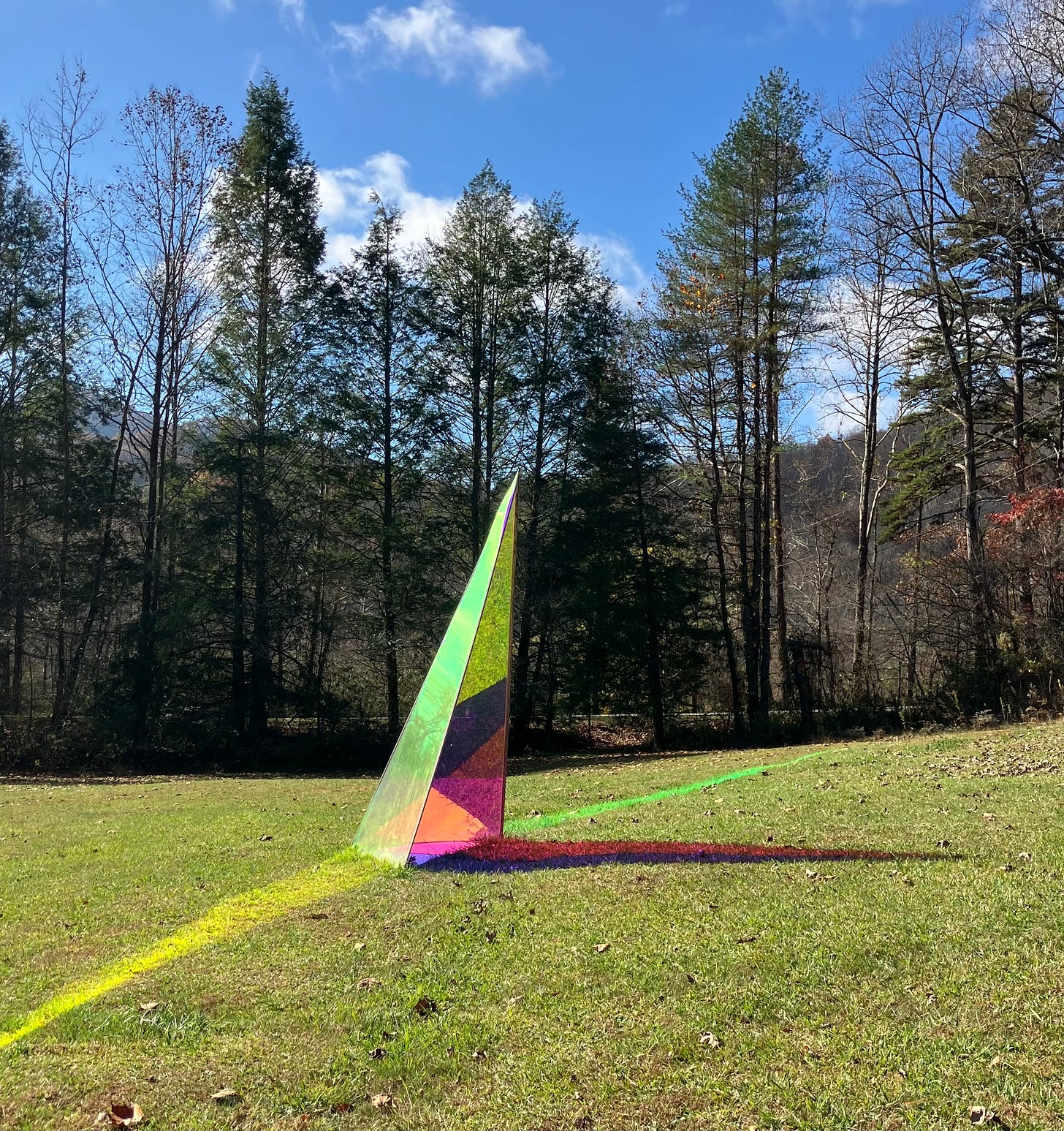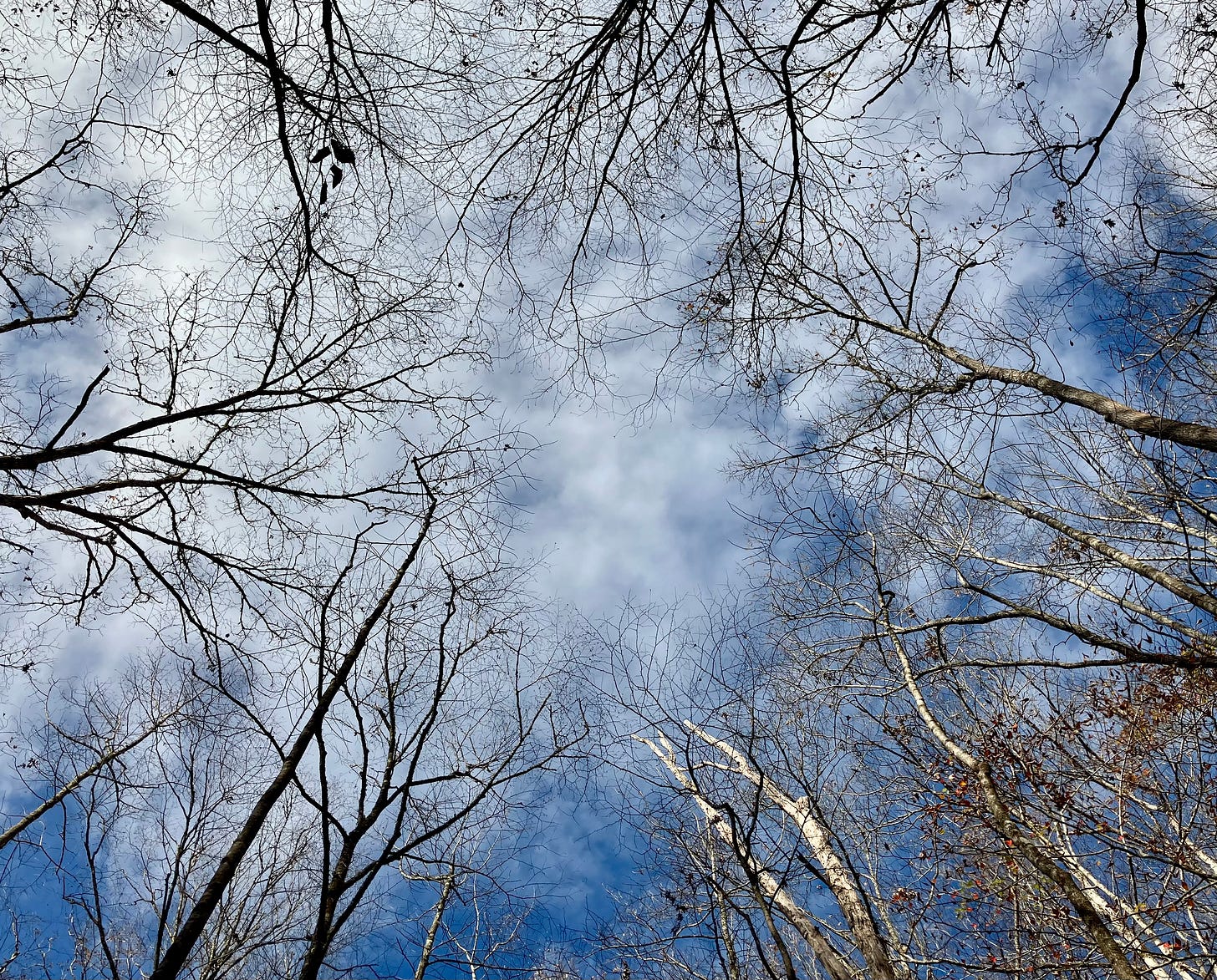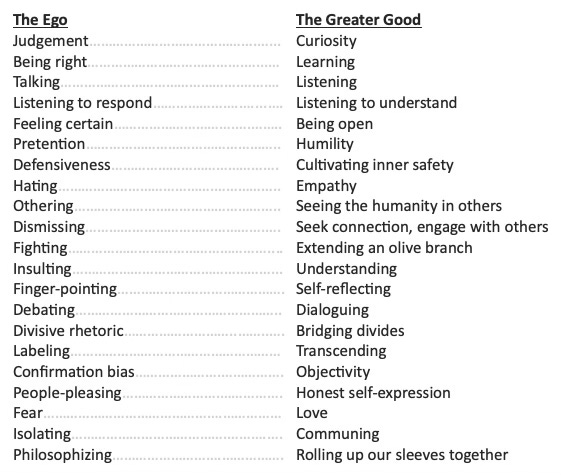It’s the morning after Election Day and day two of my off-grid writing retreat in Upstate Georgia. I’m at Hambidge Center, a 600-acre forested respite for artists of diverse disciplines. I’ve been awarded a writing residency, and I’m here to process recent losses post-Hurricane Helene.
After suppressing my emotions for over a month to coordinate daily survival needs, temporary and permanent relocation, and financial recovery, Hambidge offers an opportunity to reconnect with my neglected heart through the cathartic acts of writing and forest bathing. I have just six days before it’s back to survival mode in Asheville, so my plan is to ignore the election results and focus on self-healing.
It's a worthy goal. But it doesn’t stand a chance. I’m community-driven to my core, and old habits die hard. So I walk through the forest to the WiFi-enabled main lodge to check the online news.
After I absorb the election results, I log onto Facebook and see a bevy of insulting posts lodged from liberal acquaintances onto “anyone who voted for Trump.” I close my computer before learning if gloating Trump supporters also joined the online spectacle. The comments are disappointing but predictable, but I am a little surprised about the results, as I had prepared myself for weeks of ballot-counting. In hindsight, they’re not surprising at all.
Most of all, I feel a fire within me I haven’t felt in years – an urge to get back into political service in some capacity after a three-year break. Unexpected and inconvenient for my personal writing goals this week, I decide to let the feeling sit to see if it weakens in the days to come. But first, I have to write out an idea that is stealing my attention.
It Will Absolutely Make Us Better
Drawing inspiration from the phrase “a call to arms” and Jennifer Grayson’s insightful new book A Call to Farms (a delightful read I devoured this summer), our polarized country really needs A Call to Common Ground, I think to myself, as I hike back to my cabin. It’s the concept I’ve been most consumed with since 2020. More than ever, people need to heal intolerances and come together – in order to see each other’s humanity and collaborate on meaningful solutions to our pressing societal challenges.
I know this type of work can be hard. I know it will stretch and challenge us. But I also know it will absolutely make us better.
While some will dismiss building common ground during stubbornly divisive times as naïve, I see it as a practical necessity. Solving our biggest problems requires us to lower our defenses and engage in difficult conversations. Like it or not, our main obstacles are our own mindsets. They’re on full display on Facebook. We can do better.
Bursting Our Own Bubbles
Instead of finger-pointing, simplistically labeling our so-called adversaries, and remaining in information echo chambers (what media we follow, engaging in clickbait, who we refuse to converse with), what if we flip our approach?
What if we regularly read, watch, and listen to media sources and people we think we disagree with, like one of Thomas Sowell’s 40+ books or Fair.org’s take on racism? Or if you feel institutional racism isn’t real, perhaps a well-regarded book arguing the opposite?
What if we turn our attention to the structural and underlying issues that affect all Americans, such as the corporatization of our government and media or the toxins in our food and personal care products?
What if we each focus on one issue with diverse political support and do a dive deep to thoroughly understand the causes and solutions, such as regenerating our soil to benefit human health and sequester carbon?
My own journey of questioning some of my assumptions deepened in 2020. As a life-long independent voter, I don’t tow a party line, and my political service has mostly involved working with people from diverse political backgrounds to help make progress on universal issues. I try to follow the money and be as objective as possible. But four years ago, I became more aware of some of my blind spots and ways I was being unintentionally intolerant. I took myself on a little educational journey, reading and listening to people for the first time who I had previously dismissed.
Through doing this work, I actually feel relieved when I learn one of my assumptions is mistaken or over-simplistic. After all, this signals growth and evolution, which is what life is all about. In practicing more openness and curiosity, I’m rewiring my brain to be more positive, sharpening my skills of critical thinking, deepening my abilities to understand others, and becoming better able to help bring meaningful societal change. Learning new and challenging viewpoints is a way of life, not a sprint, and I’m here for it. Thankfully, both the journey and the rewards are meaningful and long-lasting.
Curiosity Over Judgement
It’s interesting how so many of us say we’re sad there’s so much division in America and within the same breath assert we dislike all people from another political party. Years of “othering” has weakened our muscles of empathy and humility and strengthened our muscles of fear and judgement. But there’s hope when someone admits ‘I simply don’t understand how others can vote that way,’ because embedded in that dismay is the key: understanding. We can’t understand what we won’t bother to learn about. We must learn directly from people we don’t understand.
This can be hard, because it requires suspending our ego, including our need to be right. It can feel risky, as it brings up fear and vulnerability. But as we learn to separate from our ego and see the humanity in others, we become less self-focused and more loving. And only from there do we have a chance to reverse serious issues like skyrocketing childhood cancers and continued warfare. An us-versus-them country doesn’t progress. Current and future generations need us to be braver.
Trading our ego for the greater good is essential in all our relationships, personal and political. When I catch myself in a negative or self-indulgent emotion, I try to reflect on things like the below:
Healing for the Collective
I understand some people aren’t ready to think about finding common ground. Emotions are still raw. Some are still digesting the election results, including for the House, Senate, and local races. In California alone, 10 counties flipped Republican. Right now, some are trying to comfort themselves through sarcasm, others are silently confused, and some are looking to political figures within their own party for the answers. Eventually, as people heal, the capacity for communal learning across party lines will grow.
I hope anyone navigating tough emotions will take the time they need to quiet the noise and instead turn inward. This might mean turning off the news, engaging in vigorous exercise, seeking the wisdom of leaders who uplift and unify, such as Drs. Michael B. Beckwith and Zach Bush, practicing heart-centered prayer or meditation, spending restorative time in nature, beginning each day in gratitude, or all of the above. Taking care of ourselves benefits the collective.
The good news about common ground is that it’s always here to engage with and cultivate. When you’re ready, A Call to Common Ground is an invitation to consider new viewpoints, challenge assumptions, foster respect, and help bridge divides. My hope is to plant a seed for people to nurture when the time is right for them.
On that note, inspired by my time at Hambidge and the Art As Resistance movement, I’m planting another little seed called Art as Common Ground. If you’re a writer, painter, dancer, musician, crafter, or creator of any kind (that is everyone!), please join me and explore what Art As Common Ground means to you. Use it to inspire and connect with others by using the hashtag #ArtAsCommonGround.
Thank you for reading! I look forward to learning from you all through your art, words, and actions in the months to come.
All photos were taken at Hambidge Center by April Economides, who just documented what was already there.






